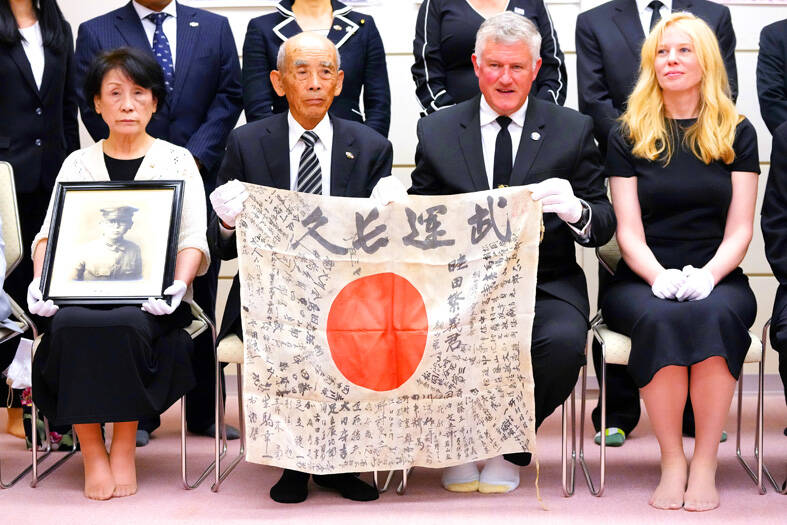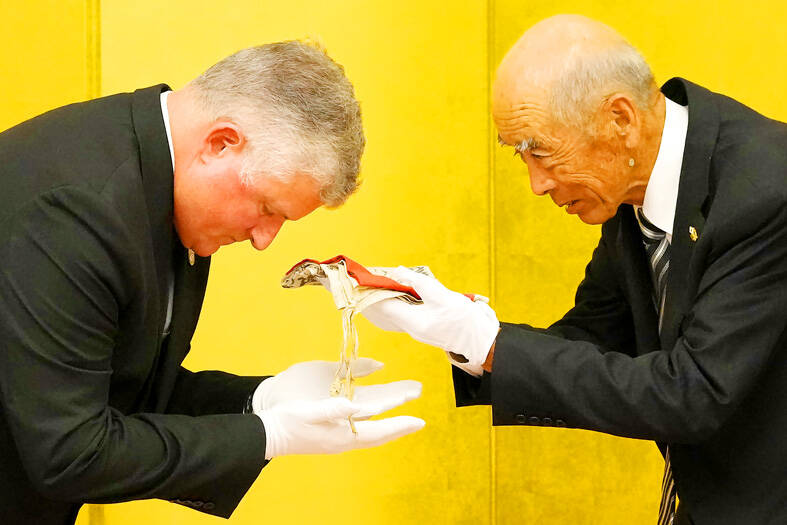Toshihiro Mutsuda was five years old when he last saw his father, who was drafted by the Japanese Imperial Army in 1943 and killed in action. For him, his father was a bespectacled man in an old family photo standing by a signed good-luck flag that he carried to war.
On Saturday, when the flag was returned to him from a US war museum where it had been on display for 29 years, Mutsuda, now 83, said: “It’s a miracle.”
The flag, known as Yosegaki Hinomaru, or good luck flag, carries the soldier’s name, Shigeyoshi Mutsuda, and the signatures of his relatives, friends and neighbors wishing him luck.

Photo: AP
It was given to him before he was drafted by the army. His family was later told he died in Saipan, but his remains were never returned.
The flag was donated in 1994 and displayed at the museum aboard the USS Lexington, a WWII aircraft carrier, in Corpus Christi, Texas.
Its meaning was not known until it was identified by the family earlier this year, said museum director Steve Banta, who brought the flag to Tokyo.

Photo: AP
Banta said he learned the story behind the flag earlier this year when he was contacted by the Obon Society, a nonprofit organization that has returned about 500 similar flags as non-biological remains to the descendants of Japanese service members killed in the war.
The search for the flag’s original owner started in April when a museum visitor took a photograph and asked an expert about the description that it had belonged to a kamikaze suicide pilot.
When Shigeyoshi Mutsuda’s grandson saw the photo, he sought help from the Obon Society, group cofounder Keiko Ziak said.
“When we learned all of this, and that the family would like to have the flag, we knew immediately that the flag did not belong to us,” Banta said at the handover ceremony. “We knew that the right thing to do would be to send the flag home, to be in Japan and to the family.”
The soldier’s eldest son, Toshihiro Mutsuda, was speechless for a few seconds when Banta, wearing white gloves, gently placed the neatly folded flag into his hands.
Two of his younger siblings, both in their 80s, stood by and looked on silently. The three children, all wearing cotton gloves so they would not damage the decades-old flag, carefully unfolded it to show to the audience.
“After receiving the flag today, I earnestly felt that the war like that should never be fought again and that I do not wish anyone else to go through this sadness [of separation],” Toshihiro Mutsuda said.
The soldier’s daughter, Misako Matsukuchi, touched the flag with both hands and prayed.
“After nearly 80 years, the spirit of our father returned to us. I hope he can finally rest in peace,” Matsukuchi said later.
Toshihiro Mutsuda said his memory of his father was foggy.
However, he clearly remembers that his mother, Masae Mutsuda, who died five years ago at age 102, used to make the long-distance bus trip almost every year from the farming town in Gifu to Tokyo’s Yasukuni Shrine, where 2.5 million war dead are enshrined, to pay tribute to her husband’s spirit.
That is why Toshihiro Mutsuda and his siblings chose to receive the flag at Yasukuni and brought framed photos of their parents.
“My mother missed him and wanted to see him so much and that’s why she used to pray here,” he said. “Today her wish finally came true, and she was able to be reunited.”
With the flag on his lap, he said: “I feel the weight of the flag.”

The Burmese junta has said that detained former leader Aung San Suu Kyi is “in good health,” a day after her son said he has received little information about the 80-year-old’s condition and fears she could die without him knowing. In an interview in Tokyo earlier this week, Kim Aris said he had not heard from his mother in years and believes she is being held incommunicado in the capital, Naypyidaw. Aung San Suu Kyi, a Nobel Peace Prize laureate, was detained after a 2021 military coup that ousted her elected civilian government and sparked a civil war. She is serving a

China yesterday held a low-key memorial ceremony for the 1937 Nanjing Massacre, with Chinese President Xi Jinping (習近平) not attending, despite a diplomatic crisis between Beijing and Tokyo over Taiwan. Beijing has raged at Tokyo since Japanese Prime Minister Sanae Takaichi last month said that a hypothetical Chinese attack on Taiwan could trigger a military response from Japan. China and Japan have long sparred over their painful history. China consistently reminds its people of the 1937 Nanjing Massacre, in which it says Japanese troops killed 300,000 people in what was then its capital. A post-World War II Allied tribunal put the death toll

‘NO AMNESTY’: Tens of thousands of people joined the rally against a bill that would slash the former president’s prison term; President Lula has said he would veto the bill Tens of thousands of Brazilians on Sunday demonstrated against a bill that advanced in Congress this week that would reduce the time former president Jair Bolsonaro spends behind bars following his sentence of more than 27 years for attempting a coup. Protests took place in the capital, Brasilia, and in other major cities across the nation, including Sao Paulo, Florianopolis, Salvador and Recife. On Copacabana’s boardwalk in Rio de Janeiro, crowds composed of left-wing voters chanted “No amnesty” and “Out with Hugo Motta,” a reference to the speaker of the lower house, which approved the bill on Wednesday last week. It is

FALLEN: The nine soldiers who were killed while carrying out combat and engineering tasks in Russia were given the title of Hero of the Democratic People’s Republic of Korea North Korean leader Kim Jong-un attended a welcoming ceremony for an army engineering unit that had returned home after carrying out duties in Russia, North Korean state media KCNA reported on Saturday. In a speech carried by KCNA, Kim praised officers and soldiers of the 528th Regiment of Engineers of the Korean People’s Army (KPA) for “heroic” conduct and “mass heroism” in fulfilling orders issued by the ruling Workers’ Party of Korea during a 120-day overseas deployment. Video footage released by North Korea showed uniformed soldiers disembarking from an aircraft, Kim hugging a soldier seated in a wheelchair, and soldiers and officials